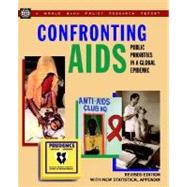Confronting Aids Public Priorities in a Global Epidemic
, by World Bank; USA, Oxford University Press- ISBN: 9780195215915 | 0195215915
- Cover: Paperback
- Copyright: 10/1/1999
Two decades after the appearance of human immunodeficiency virus (HIV),the HIV/AIDS epidemic has spread across the industrialized and developing world.Of the estimated 30 million people who have contracted the virus, six millionhave died of AIDS. About 90 percent of worldwide infections occur in developingcountries, where disease has already reduced life expectancy in some cases bymore than a decade. HIV, already widespread among the general population of manysub-Saharan African countries, may be on the verge of exploding in otherregions; the number of new infections occurring each year in Asia may alreadyhave surpassed those in Africa. Because most people who contract HIV are adultsin the prime of life, AIDS extracts a heavy toll on surviving family, especiallychildren and the elderly, and is likely to exacerbate poverty and inequality.Clearly, the human and economic toll of the epidemic is great. But efforts tocombat HIV use resources that could also have been applied to other pressinghuman needs, especially in the lowest income countries. How should developingcountry governments and the international community respond?This book provides strategy for policymakers, development specialists, publichealth experts, and others in a position to influence the public response to theepidemic to consider how society and governments in particular should interveneto confront HIV/AIDS. In doing so it draws upon three bodies of knowledge: theepidemiology of HIV; public health insights into disease control; and especiallypublic economics, which focuses on assessing tradeoffs in the allocation ofscarce resources. The report argues that AIDS is a large and growing problem andthat governments can and should actively confront the epidemic. It finds thatsome policies will be much more effective than others, and it distinguishesbetween activities that should be left to households and the private sector,including non-governmental organization (NGOs); those that should be initiatedby developing governments; and those that can best be undertaken by theinternational development community.






